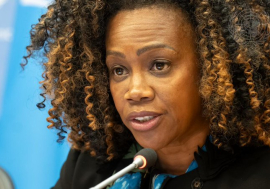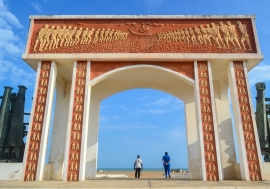Africa welcomes new trade initiatives from Japanese investors
Africa welcomes new trade initiatives from Japanese investors
African leaders who took part in the Sixth Tokyo International Conference on Africa’s Development (TICAD VI), held last August in Nairobi, Kenya, are eager to test the latest Japanese commitment to investment and development on the continent and how it will improve the quality of life of African citizens.
After the welcoming ceremony, which was full of colour and culture, the leaders, together with business and civil society representatives, quickly began the serious business of fashioning ways to transform Africa’s economies and improve political stability.
Japanese Prime Minister Shinzo Abe, who co-chaired TICAD VI with Kenya’s President Uhuru Kenyatta, had come with leaders of more than 70 Japanese companies to the event in Nairobi. Also attending were presidents Jacob Zuma of South Africa, Muhammadu Buhari of Nigeria, Macky Sall of Senegal, Ellen Johnson-Sirleaf of Liberia and Filipe Nyusi of Mozambique.
Drawn to the Kenyatta International Convention Centre, the venue of the conference, were some 18,000 participants, including 300 top business executives, 1,700 business representatives from Japan and 2,000 from Africa.
Setting the tone
TICAD, organized by the Japanese government, the UN’s Office of the Special Adviser on Africa, the UN Development Programme, the African Union (AU) and the World Bank, this year held its first session on the African continent since it was launched in 1993. In response to pressure from African participants, meetings will from now on be held every three years instead of every five years, with alternate hosting by Japan and Africa.
As with all previous five events, leaders used this year’s TICAD to deliberate on Africa’s socio-economic development, using the yardsticks of the Sustainable Development Goals and Agenda 2063, a set of aspirations adopted by African leaders to transform the continent.
Prime Minister Abe set the tone in his opening address: “Africa is now up and running, aiming at long-range goals, aspiring to be a certain kind of continent with certain kinds of countries in 2063.”
In addition to agriculture and infrastructure development, participants said improved trade can boost Africa’s industrialization. The 77 Japanese companies whose leaders accompanied Mr. Abe to Nairobi were big and not-so-big corporations, indicating an attempt to connect with Africa at varying levels of trade and investment.
“These are firms which are passionate about Africa,” Mr. Abe stated. “I hope my visit will boost bilateral relations with Kenya and Africa.”
Friendship and trade
The two-day event was as much a jamboree as it was a marketplace of ideas. Companies set up tents to advertise products and services even as political and business leaders were busy canvassing their individual country’s attractiveness to foreign investments. But it was the announcement of Japan’s commitment to mobilize $30 billion for Africa’s infrastructure, health care system and security that grabbed the headlines.
There was also a package to train or “empower” up to 10 million Africans over the next three years, including 1,500 experts under Japan’s African Business Education Initiative for Youth (ABE Initiative), and an additional 30,000 engineers by 2018 to support “the foundations of industry,” said Mr. Abe.
Participants considered three priority areas for Africa’s development. The first is economic diversification and industrialization, which require investments in roads, ports, energy and food value chains. The second is building a resilient health system, an issue that gained urgency following the 2014 Ebola outbreak and the inability of the health systems of Guinea, Liberia and Sierra Leone to respond to the epidemic.
And finally, achieving social stability, which will require leaders to tackle socioeconomic instability and climate change disasters through jobs creation for women and youth, disaster risk management and others. The hope is that economic stability will diminish the propensity for armed insurrections.
While maintaining that Japan will not let up on supporting efforts to “resolve the issues facing Africa” such as insecurity and the plunge in commodity prices, Mr. Abe also underlined the fact that Japan’s relationship with Africa is not one-way traffic in which only one partner benefits.
“We have a feeling in our gut that in Africa, where possibilities abound, Japan can grow vigorously. Japanese companies can grow vigorously.” Despite current economic problems, experts believe the continent’s abundant natural resources, growing population and rising middle class offer good investment opportunities for Japan’s companies.
Japan currently has a balance-of-trade advantage over Africa. In 2015 its exports to Africa were valued at $11.6 billion, while imports were valued at $8.5 billion, according to the Japan External Trade Organization. Rich countries need to trade more with developing countries, advised President Kenyatta.
Infrastructure plan
President Kenyatta welcomed Mr. Abe’s announcement that $10 billion of the expected $30 billion would be injected into a three-year African Infrastructure Plan targeting projects in education, energy, urban transport (roads and ports), health, agriculture and others. The funds will be channeled through the African Development Bank (AfDB) to boost Africa’s electricity generation by 2,000 megawatts and connect 3 million homes to electricity by 2022.
Japan and the AfDB have a long-standing relationship. Between 2005 and 2014, Japan, under its Enhanced Private Sector Assistance for Africa programme, announced sums totaling $3 billion for the AfDB to support sovereign co-financing of projects in agriculture, water, health and infrastructure. Examples of such successfully executed projects are the Bujagali hydropower plant in Uganda, the Sahanivotry hydropower plant in Madagascar, the Lekki toll road in Nigeria and the Takoradi II gas-fired plant in Ghana.
While its engaging with AfDB indicates a strategy of partnering with pan-African institutions to implement projects, Japan is also dealing directly with individual countries, such as by providing Egypt with a $451 million loan earlier this year for the construction of the Grand Egyptian Museum.
At TICAD VI, a total of 73 agreements were signed in what was dubbed the “Nairobi Declaration.” Some of the bigger deals include the signing of an agreement between the AfDB and Sumitomo Mitsui Banking Corporation to promote Africa’s economic development. Both institutions will cooperate to provide finance for trade as well as for industrial and infrastructural projects and efforts to mitigate trade risks.
Japanese companies are interested in Africa’s green energy, agriculture, automobile, motorcycle, textiles, finance and service-sector projects. Toyota Tsusho is developing geothermal energy generation at Olkaria II plant in Naivasha, northwest of Nairobi. The company is also involved in fertilizer production in other countries. Toshiba Corporation, an electronics and energy firm, signed an agreement with Kenya Power and Lighting Company on a project that will cut power distribution losses in the national grid.
Business-friendly environment
President Kenyatta expressed Kenya’s readiness to “support partnerships that will ensure that our youth not only get quality jobs but our farmers can also earn more from their sweat and at least 90% of their agricultural exports are processed locally.”
Some experts say Japan could have done more for Africa, considering that in May 2015 the country announced a commitment of $110 billion to develop infrastructure in Asian countries. But African leaders generally lauded the goals of TICAD and Japan’s relations with Africa, which they viewed as respectful. They want homegrown solutions to Africa’s problems. Rwanda’s Paul Kagame said, “Modernity does not mean importing values; it means improving your own values,” underscoring the need for partners to support Africa’s initiatives.
Mozambique’s President Filipe Nyusi envisioned “the construction of the economic and financial independence of our continent.”
Nigeria’s presidential spokesman Garba Shehu said President Buhari wooed new investors and extracted commitments from existing ones, including Honda Motor Company, Mitsubishi Corporation, Toyota Tsusho, and West African Seasoning Company, to expand operations in the country.
Despite African countries’ depiction of their continent as ready for investments, Prime Minister Abe and his entourage continued to stress the need to strengthen a more business-friendly environment. Mr. Shehu interpreted that as an indirect reference to “the problem of insecurity.” Nigeria is battling Boko Haram insurgents, and across the border from Kenya is Somalia, where the Al-Shabaab rebels continue to wreak havoc, sometimes inside Kenyan territory.
At the summit, Chadian president and AU chairperson Idriss Déby called on Japan and other partners to contribute to the AU counter-terrorism fund.
Experts suggest that a business-friendly environment also means stable economic and trade policies and reliable infrastructure, which many African countries lack. Nevertheless, Tomohiko Taniguchi, a special adviser to the Japanese government, says “otherwise risk-averse Japanese companies have finally come to be aware that Africa can provide them with real growth opportunities.”
A highlight of TICAD VI was the launch of the Japan-Africa Public and Private Economic Forum, which is expected to serve as a platform for forging business ties between governments and corporations. The forum will bring the “power of the public and the private sectors together to forge solutions,” said Mr. Abe, adding that Japanese cabinet members and top business executives will visit Africa every three years to meet with African companies to identify “what needs to be done to enable Japanese and African companies to do more business together going forward.”
For its African beneficiaries, TICAD VI was a shot in the arm. President Jacob Zuma, representing South Africa, Japan’s largest trading partner, said that what is now needed is for Japanese investments “to be structured in a way that all [African] countries are able to benefit, particularly when it comes to bigger projects.” That’s a view that will cheer leaders of Africa’s smaller economies.
The next TICAD will be held in 2019 in Tokyo and should be one more opportunity to take stock of progress made since the Nairobi Declaration.



























